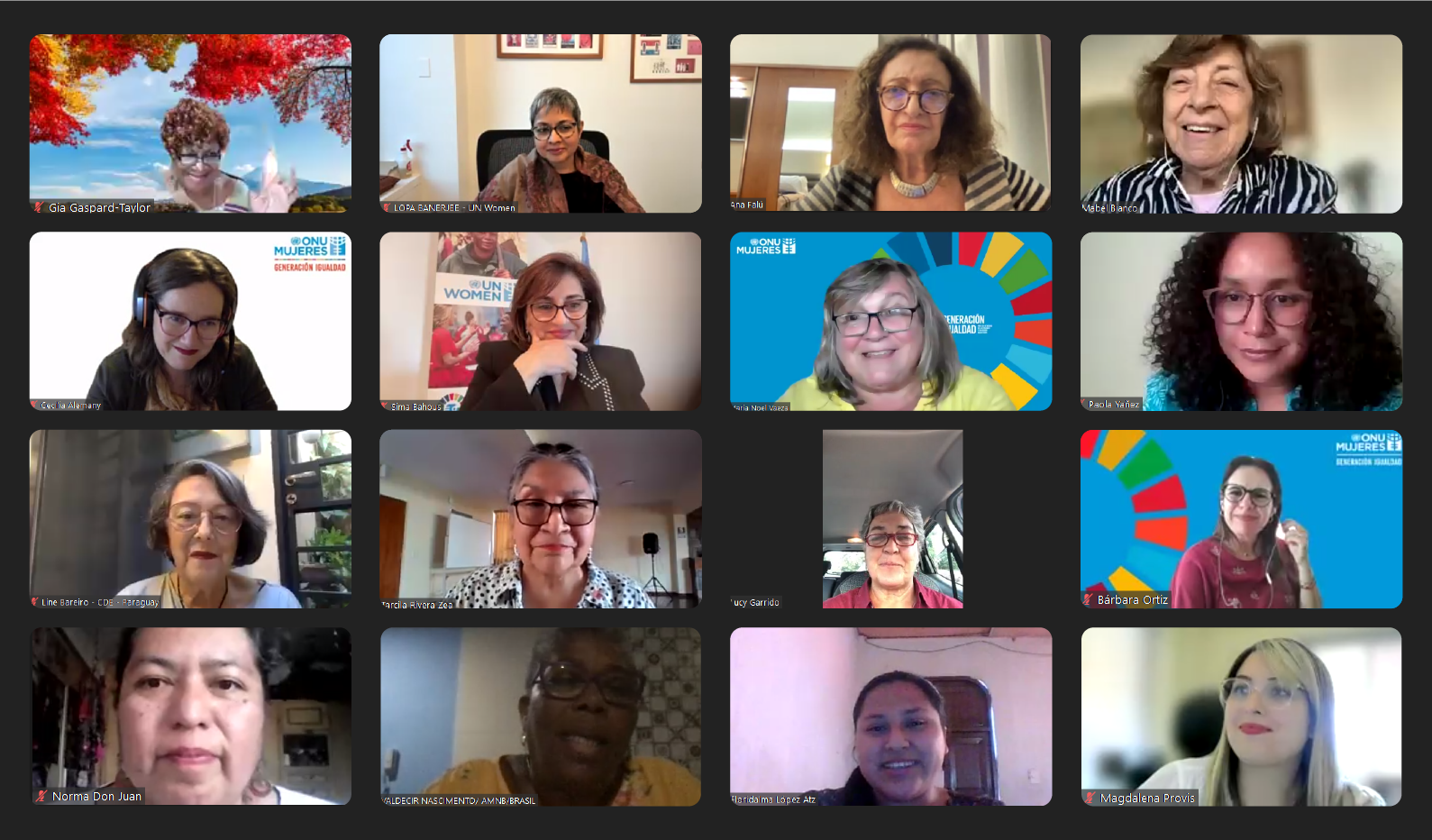UN Women Executive Director Sima Bahous reaffirms UN Women's commitment to feminist, women's, and civil society organizations in Latin America and the Caribbean
Date:

"I am here today with an open heart and mind to listen to your perspectives and learn from you" with these words Sima Bahous, Under-Secretary-General of the United Nations and Executive Director of UN Women, opened the first meeting with representatives of feminist, women's and civil society organizations from Latin America and the Caribbean.
At the meeting, which took place on Wednesday, February 23, with the participation of more than 250 representatives of organizations from the region, the Executive Director addressed the situation of women's human rights and environmental defenders, the human mobility crisis, the impact of COVID-19 and the region's vulnerability to climate change, emphasizing that "these are issues of special concern to me, and that is why we are here to obtain information on their challenges and strategies to address our common agenda."
The meeting was attended by María Noel Vaeza, UN Women Regional Director for the Americas and the Caribbean, who welcomed Ms. Bahous to the region and moderated by Cecilia Alemany, UN Women Deputy Regional Director for the Americas and the Caribbean.
In the first segment, the Executive Director heard interventions from Ana Falú, representative of the Centro de Intercambio y Servicios para el Cono Sur Argentina (CISCSA) / Red Mujer y Hábitat; Line Bareiro, representative of the Centro de Documentación y Estudios (CED); Lucy Garrido, part of Articulación Feminista Marcosur (AFM); Mabel Bianco, from the NGO Committee on the Status of Women in Latin America and the Caribbean - CoNGO CSW LAC; Paola Yáñez, representative of the Network of Afro-Latin American, Afro-Caribbean and Diaspora Women (RMAAD); Tarcila Rivera Zea, representative of the Continental Network of Indigenous Women of the Americas (ECMIA); Floridalma López Atz, part of the Guatemalan Parliament of Children and Adolescents; Gia Gaspard-Taylor, of the Network of Rural Women Producers of Trinidad and Tobago (Red de Mujeres Rurales Productoras de Trinidad y Tobago).
Ms. Bahous emphasized to the representatives "the historic victories and hard-won achievements of women's movements in this incredibly diverse region." She also referred to the upcoming session of the Commission on the Status of Women, which this year will have as its priority theme "Achieving gender equality and empowering all women and girls in the context of climate change, environment and disaster risk reduction policies and programs" as an opportunity to make further progress in promoting gender equality and the empowerment of women in all spheres. In this regard, the Executive Director noted that it is hoped "that the Member States will respond favorably to the recommendations of the United Nations Secretary-General, as indicated in his report on the priority theme."
Meanwhile, Regional Director María Noel Vaeza stressed that this meeting "is a unique opportunity to share relevant aspects about the reality of the region and to learn how we can continue to strengthen collaboration with civil society, which will be very useful for refining the organization's global priorities, as well as for the preparation of the next Strategic Note of the Regional Office for the period 2022-2025".
The interventions of the representatives of feminist, women's, and civil society organizations were a sample of the value, diversity, and strength of the movement in the region, as pointed out by Deputy Regional Director Cecilia Alemany during the moderation. In addition to the representatives mentioned above, Valdecir Nascimiento, from the Articulation of Brazilian Black Women's Organizations (AMNB) and Norma Don Juan Pérez, part of Enlace Continental de Mujeres Indígenas Región México de México, also took the floor.
The link and the work of UN Women with civil society were highlighted by Mabel Bianco, from the NGO Committee on the Status of Women in Latin America and the Caribbean - CoNGO CSW LAC, who said that "feminists fought to have UN Women in our region, we were the first region to have a Civil Society Advisory Committee. We feel that UN Women is our organization, so we ask them to deepen this dialogue and continue consolidating these spaces". Floridalma Lopez Atz, representative of the Guatemalan Parliament of Children and Adolescents, added: "it is necessary to generate more spaces for the effective participation of women, as well as to recognize the intercultural perspective that allows opening specific spaces for girls and Afro-descendant and indigenous women in the development of programs aimed at them."
For her part, Tarcila Rivera Zea of the Enlace Continental de Mujeres Indígenas de las Américas (ECMIA) pointed out that " we elders are dreaming of better conditions for the new generations. We want discrimination not to be a constant in the lives of young indigenous and Afro-descendant women because we had to fight, to struggle, and we do not want them to continue living the same. We have to eradicate violence of all kinds.”
The impact of the pandemic and the climate crisis in the Caribbean was addressed by Gia Gaspard-Taylor, of the Network of Rural Women Producers of Trinidad and Tobago, who said that excessive coastal erosion and degradation of coral reefs had increased plagues, and storms have become increasingly violent. "We have suffered from isolation and rising temperatures due to climate change, so we believe that civil society must play a greater role in decision making.
After more than an hour and a half of cross-cutting dialogue, Bahous took the floor again to thank feminist, women's, and civil society organizations from Latin America and the Caribbean for their time, work, and testimonies. "Listening to you is my priority as Executive Director. I want to tell you that UN Women will continue to cultivate partnerships with women's organizations and groups that are often left behind, in line with the 2030 Agenda and the SDGs, including rural, indigenous and Afro-descendant women, girls and young women, LGBTQI+ people and women with disabilities, migrant and refugee women."